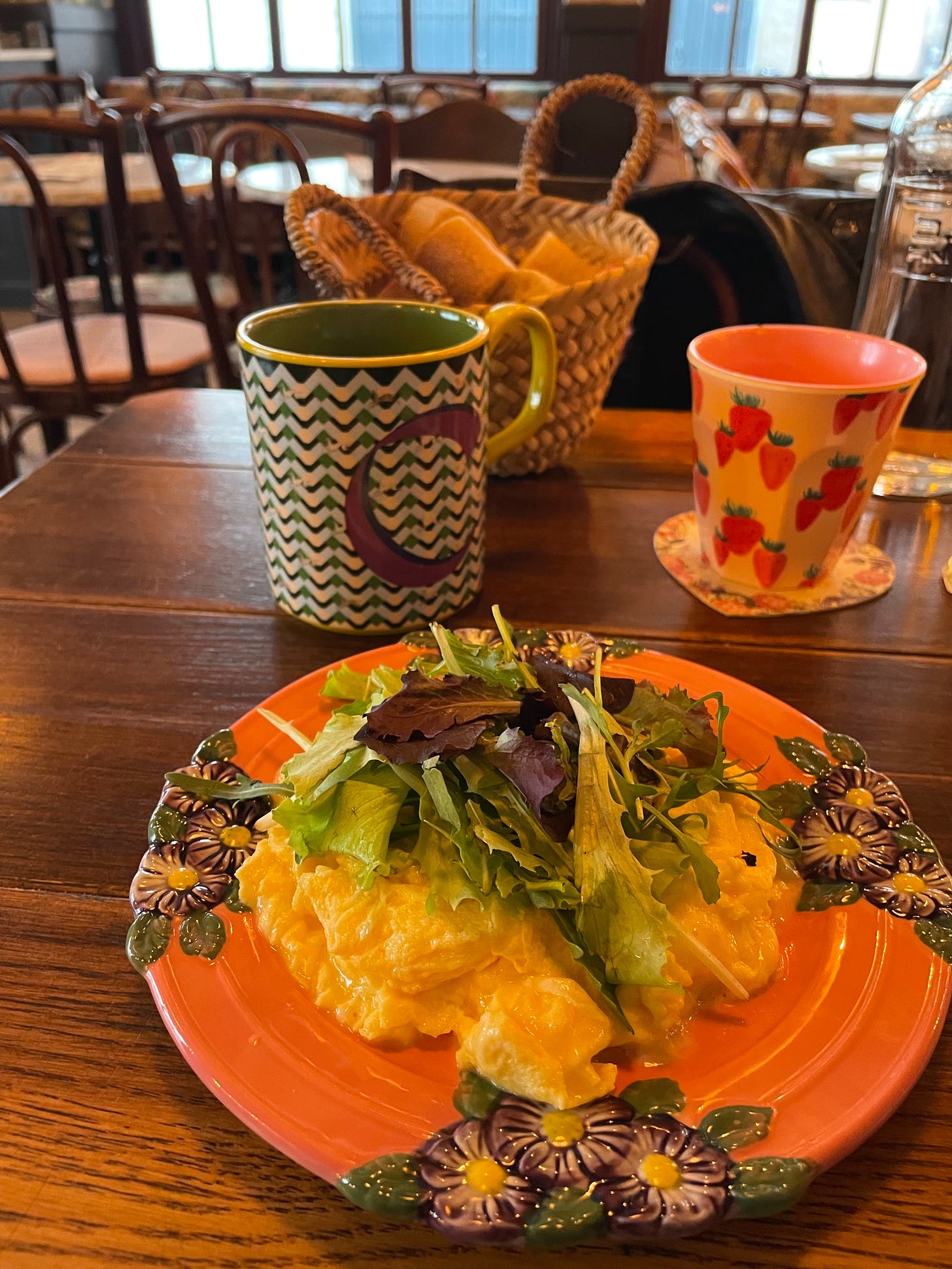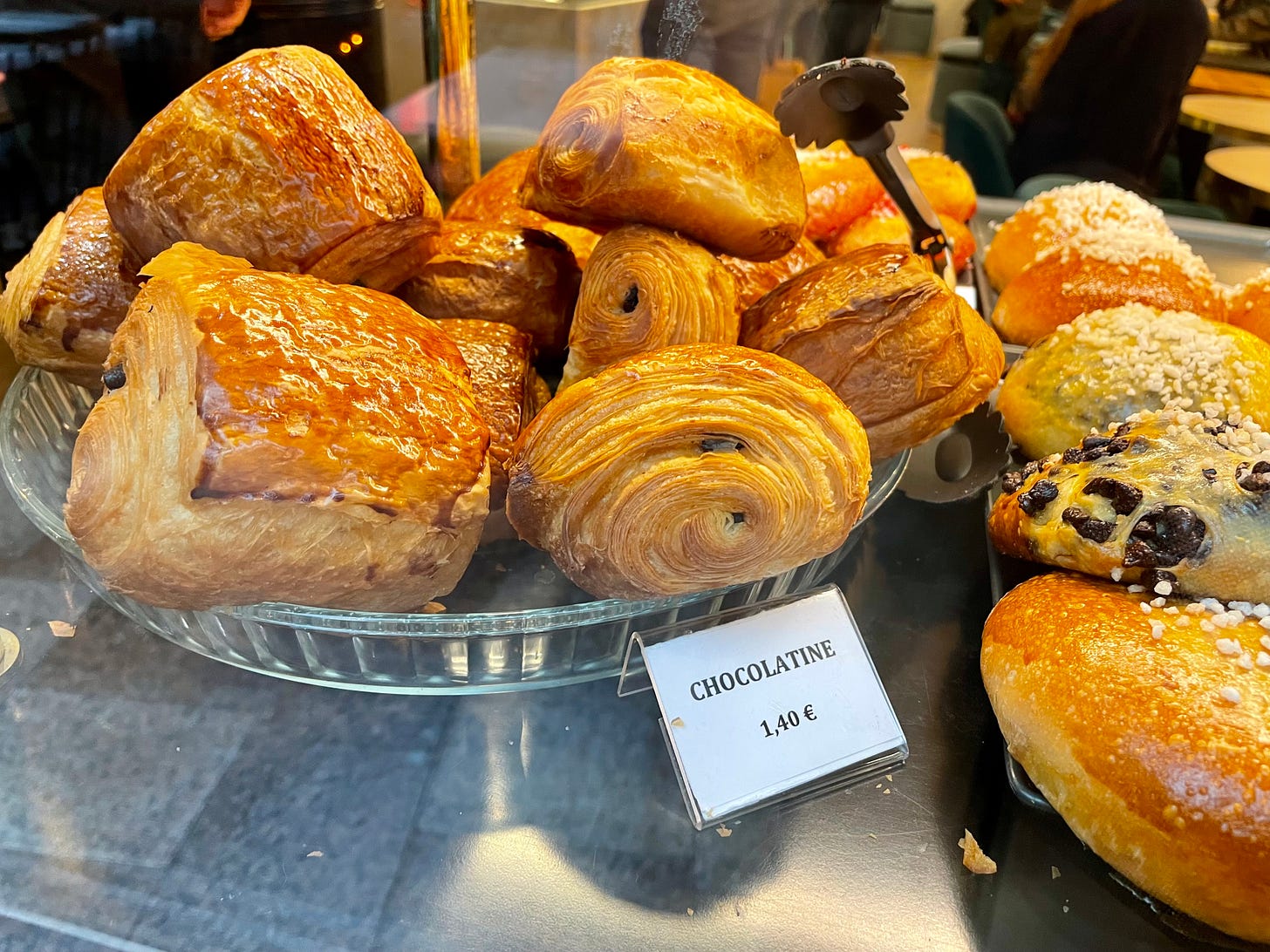Note to readers:
If you enjoy reading “Lettres de France” join me weekly in Substack’s “Notes” where I share “Vignettes de France,” shorter stories in English or in French.
Bonjour, c’est Véro
Samedi matin. Quelque part à Paris
(Saturday morning. Somewhere in Paris.)
A couple of hours before catching the TGV back to the Loire Valley at the end of a Parisian week I am sitting at a favorite breakfast place, savoring my oeufs brouillés nature (plain scrambled eggs) with un café filtre, noir (drip coffee, no sugar, no cream.)
There’s hardly anyone there.
It’s still early in the French capital. Un habitué (a regular) is living proof as he sips un express (an espresso) at the counter, his brief answers to the bartender’s questions mere grunts.
I diagnose une gueule de bois (hangover.)
A group of 30-somethings enters, all males sporting a beard. De rigueur. Beards have been an enduring trend in French life (like branded sneakers and the ubiquitous du coup popping up at the most inopportune time in conversations.)
They sit down. It takes a while to remove their puffer jackets. It’s been cold in Paris lately.
I detect a southern accent when one of the ladies exclaims “C’est mignon ici !” (It’s cute here.) They are hungry. They quickly peek at the enticing brunch menu ready to order.
The waiter (no beard) materializes by their side taking notes.
Walking away he turns around to reply to a guest’s last minute request. I hear: “Une chocolatine ? Un pain au chocolat, quoi !”
C’est parti. The game is on.
This is one of France’s most endearing rituals, debating what to name the delicious viennoiserie filled with chocolate (a chocolate croissant beyond our borders): pain au chocolat or chocolatine.
This is determined by geography. Most of Southwestern France (all the way to Bordeaux) is Chocolatine Country. The rest of the country continues to refer to le pain au chocolat.
Personne n’est parfait. Nobody’s perfect.
This phenomenon is not that old (it started in the 1990s.) In recent years it’s become a way of showing pride in regional roots. It’s a sign of rebellion against overbearing Parisian ways. It’s also an opportunity to indulge in one of France’s favorite sports, the art of debate.
“Vous êtes d’où? De Toulouse?” (Where are you from, Toulouse?,) the waiter asks the young woman who craves the flaky pastry.
Across the room this Toulousaine smiles.
“Non, plus au Sud” (No, farther south) she replies, her accent even more noticeable.
“Ah, ok,” the waiter says nicely, “here in Paris, we say ‘pain au chocolat.’”
I can’t help jumping in. In full support of my fellow southerners I interject from my table: “Ils ont raison. Ce sont des chocolatines. Parole de Toulousaine” (They are right. These are chocolatines. Take this Toulouse native’s word for it.)
The waiter smiles. He has a sense of humor. After sending the group’s order to the kitchen he walks over, and I probe:
“Vous êtes d’où, vous ?” (Where are you from?)
“De Nantes” (from Nantes, Western France) he replies.
Bien sûr. Of course. Another import. Most Parisians you meet along the streets or at café terraces these days are not actually from Paris.
More often than not they are here because Paris offers renowned schools, more opportunities and higher salaries than the rest of France. Some enjoy living here. Overtime they become more Parisian than native Parisians (not always in a good way, but that’s a story for another time.)
Others are just biding their time in the expensive, crazy big city and take frequent trips home to la province (everywhere outside Paris and the Ile de France) every chance they get.
The waiter is happy to have someone to chat with. He has lived in Paris for five years. He likes it here.
We engage in a conversation about regional differences. He has some interesting contributions such as the different ways of referring to a pencil. Is it crayon à papier, crayon de papier, or crayon de bois (like in northern France or his native Loire Atlantique?)
We chat about the weather too, inspired by the cold temps and depressing grisaille (grey skies) we’ve put up with for months it seems. Nantes gets a lot of rain, he confirms, but you have to live there for a while to know that. So does Toulouse in the spring, I add.
It’s almost time for me to head back to the apartment and finish packing. The Loire Valley and my French life en province await.
“Finalement, je prendrais bien une chocolatine à emporter” (I’d love a chocolate croissant to go,) I quip as he prepares l’addition (the check.)
“Et un pain au chocolat pour la dame, un !,” he shouts at the bartender without missing a beat. (One chocolate croissant for the lady!)
Bienvenue en France where from Toulouse to Nantes and all the way to Paris folks agree to disagree about a delicious piece of puff pastry.
Bienvenue en France where from Toulouse to Nantes and all the way to Paris I will always belong.






What a sweet story! I so appreciate it when you share vignettes such as this.
Your lovely articles make me really wish I was there enjoying those delicious chocolatines